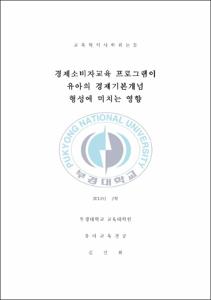경제소비자교육 프로그램이 유아의 경제기본개념 형성에 미치는 영향
- Abstract
- The purpose of this study is to know the effect of the consumer economy education program for children on durability of basic economic molding, provide basic data of a program helping children develop basic economy concepts in the children education spot, and to help children practice sound economic activities as consumers.
Research problems was established as follows in accordance with the purpose of this study:
1. What is the effect of the consumer economy education program on the basic economic concept molding of children?
2.. What is the effect of the consumer economy education program on the durability of basic economic concept molding of children?
3. What is the effect of the consumer economy education program on the basic economic concept molding of children in accordance with sex?
32 five-year-old children were selected from "I" kindergarten located in "H" ward, Busan City for the experimental group, and other 32 five-year-old children were selected from the same kindergarten located for the comparative group. In order to know the effect, a spot-centered consumer economy education program was peformed twice a week for 11 weeks(from Mar 18, to May 31, 2013). The program for this study was performed by the homeroom teacher in charge, with assistance of the homeroom teacher of the experimental group. The children of the comparative group participated in the economy education activities related to living themes based on the NURI curriculum activity plan. After performing 18 times of experimental treatment, a posttest was performed from Jun 3 to 14 Jun, 2013 in order to know the difference of basic economic concept and a follow-up test was performed in 10 weeks(from Aug 26 to Sep 6, 2013) in order to know durability of the experimental effect.
This study used a research tool of basic economy concept for children, a questionnaire composed of 31 questions developed by Mija Park(2008), in order to measure basic economy concepts of children.
This study used SPSS 18.0 to perform statistical treatment of collected data.
The results of this study can be summarized as follows:
First, the consumer economy education program had a positive effect on improvement of basic economic concept of children. In the subcategories of basic economic concept, the scores of experimental group children were higher than those of comparative group children in 7 subcategories(scarcity & selection·chance cost, consumption, products & service, money, job & work, market, price & exchange), and it was shown that the consumer economy education program for children improved basic economic concept.
Second, the consumer economy education program also had a positive effect on improvement of durability of basic economic concept. In the follow-up test performed in 10 weeks, it was also shown that the scores of experimental group children were insistently higher than those of comparative group children in 7 subcategories.
Third, effect of the consumer economy education program had difference between boys and girls, which had positive effect on girls rather than boys.
Summing up the above results, the consumer economy education program had positive effect on the basic economic concept molding of children. And the program also had continuous effect on the basic economic concept of children.
- Issued Date
- 2014
- Awarded Date
- 2014. 2
- Type
- Dissertation
- Publisher
- 부경대학교
- Affiliation
- 교육대학원
- Department
- 교육대학원 유아교육전공
- Advisor
- 이정화
- Table Of Contents
- 목 차
Abstract
Ⅰ.서론 1
1. 연구의 필요성 및 목적 1
2. 용어의 정의 5
가. 경제소비자 교육 5
나. 경제기본개념 6
Ⅱ. 이론적 배경 7
1. 경제소비자교육 7
가. 경제소비자교육의 정의 7
나. 경제소비자교육의 목적 및 필요성 8
다. 경제소비자교육 프로그램 교수학습 방법 11
2. 경제기본개념 12
가. 경제기본개념의 정의 12
나. 경제기본개념의 하위요소 14
(1) 희소성과 선택·기회비용 14
(2) 소비 14
(3) 상품과 서비스 14
(4) 화폐 14
(5) 가격과 교환 15
(6) 직업과 일 15
(7) 시장 15
다. 유아의 경제개념 발달 15
라. 경제기본개념의 체계 19
Ⅲ. 연구방법 23
1. 연구대상 23
2. 연구도구 23
가. 프로그램 23
(1) 프로그램 목표 23
(2) 프로그램 내용 24
나. 경제기본개념 검사도구 26
3. 연구절차 28
가. 교사훈련 및 검사자 훈련 28
나. 예비검사 28
다. 사전검사 29
라. 실험처치 29
마. 사후검사 32
바. 추수검사 32
4. 자료분석 32
Ⅳ. 연구결과 33
1. 경제소비자교육프로그램이 유아의 경제기본개념 형성에 미치는 영향 33
2. 경제소비자교육프로그램이 유아의 경제기본개념 형성에 미치는 영향의 지속성 35
3. 유아의 성별에 따른 경제소비자교육프로그램의 영향 39
Ⅴ. 논의 및 결론 43
1. 논의 43
가. 경제소비자교육프로그램이 유아의 경제기본개념 형성에 미치는 영향 43
나. 경제소비자교육프로그램이 유아의 경제기본개념 형성에 미치는 영향의 지속성 46
다. 유아의 성별에 따른 경제소비자교육프로그램의 영향 47
2. 결론 및 제언 48
51
1. 경제소비자교육 프로그램 59
2. 경제기본개념 검사지 79
3. 경제기본개념 검사 채점 기준표 81
- Degree
- Master
- Files in This Item:
-
-
Download
 경제소비자교육 프로그램이 유아의 경제기본개념 형성에 미치는 영향.pdf
기타 데이터 / 848.19 kB / Adobe PDF
경제소비자교육 프로그램이 유아의 경제기본개념 형성에 미치는 영향.pdf
기타 데이터 / 848.19 kB / Adobe PDF
-
Items in Repository are protected by copyright, with all rights reserved, unless otherwise indicated.